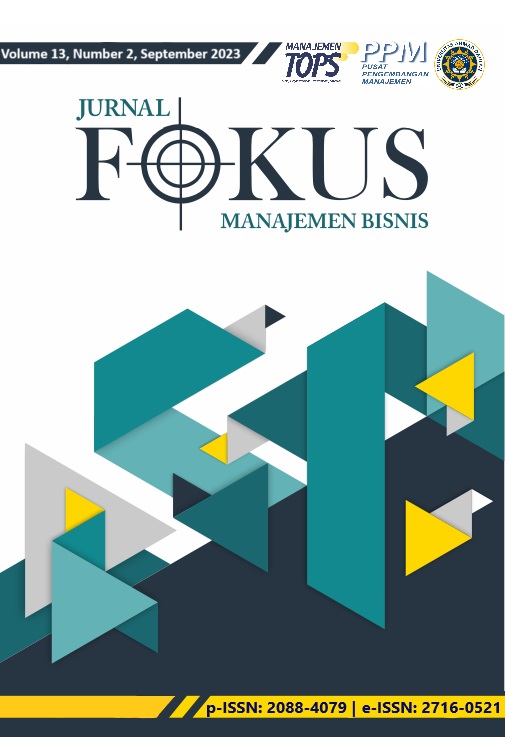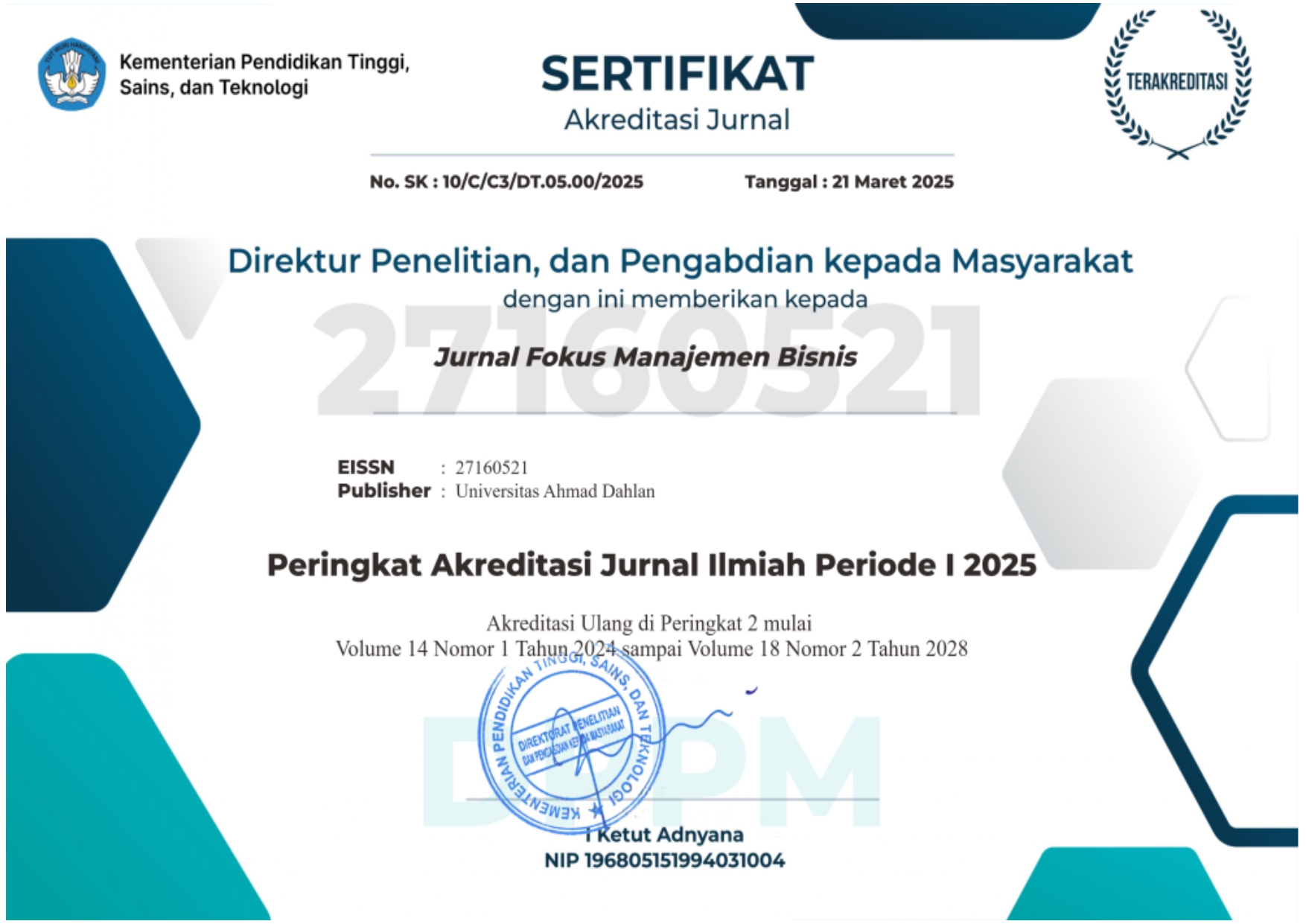Mediating brand trust, brand attitude, and brand psychological ownership on celebrity endorsers to behavioural intention
DOI:
https://doi.org/10.12928/fokus.v13i2.8591Abstract
The marketing type that is found on social media today is celebrity endorsement. To encourage consumer behavioural intention, luxury brand companies take several strategies, including using celebrity endorsers to introduce their brand and to build brand trust, brand attitude, and brand psychological ownership. This study aims to examine the influence of celebrity endorsers on behavioural intention through the mediation of brand trust, attitude, and psychological ownership. A total of 250 samples were determined by purposive sampling. This research used a quantitative approach and structural equation modelling (SEM) AMOS as a data analysis technique. The result showed a mediating effect of brand trust, attitude, and psychological ownership on the relationship between celebrity endorsers and behavioural intention.
References
Albert, N., Ambroise, L., & Valette-Florence, P. (2017). Consumer, Brand, Celebrity: Which Congruency Produces Effective Celebrity Endorsements?. Journal of Business Research, 81. https://doi.org/10.1016/j.jbusres.2017.08.002
Almaida, A., Baumassepe, A. N., & Azzahra, W. F. (2020). Social Media Influencers vs Brand Ambassadors For Brand Image. International Journal of Innovation, Creativity and Change, 12(3).
Brigham, E. F., & Houston, J. F. (2019). Fundamentals of Financial Management. Cengage Learning.
Chin, P. N., Isa, S. M., & Alodin, Y. (2020). The Impact of Endorser and Brand Credibility on Consumers’ Purchase Intention: The Mediating Effect of Attitude towards Brand and Brand Credibility. Journal of Marketing Communications, 26(8). https://doi.org/10.1080/13527266.2019.1604561
Chung, S., & Cho, H. (2017). Fostering Parasocial Relationships with Celebrities on Social Media: Implications for Celebrity Endorsement. Psychology and Marketing, 34(4). https://doi.org/10.1002/mar.21001
Dwivedi, A., & Johnson, L. W. (2013). Trust-Commitment as A Mediator of The Celebrity Endorser-Brand Equity Relationship in A Service Context. Australasian Marketing Journal, 21(1). https://doi.org/10.1016/j.ausmj.2012.10.001
El Naggar, R. A. A., & Bendary, N. (2017). The Impact of Experience and Brand Trust on Brand Loyalty, while Considering The Mediating Effect of Brand Equity Dimensions: An Empirical Study on Mobile Operator Subscribers in Egypt. The Business & Management Review, 9(2), 16–25. https://doi.org/10.1062/ABRM-11-2017-0128
Enehasse, A., & Saglam, M. (2020). The Impact of Digital Media Advertising on Consumer Behavior Intention: The Moderating Role of Brand Trust. Journal of Marketing and Consumer Research, 68, 22–32. https://doi.org/10.7176/jmcr/68-04
Folse, J. A. G., Burton, S., & Netemeyer, R. G. (2013). Defending Brands: Effects of Alignment of Spokescharacter Personality Traits and Corporate Transgressions on Brand Trust and Attitudes. Journal of Advertising, 42(4). https://doi.org/10.1080/00913367.2013.795124
Foroudi, P., Palazzo, M., & Sultana, A. (2021). Linking Brand Attitude to Word-of-Mouth and Revisit Intentions in The Restaurant Sector. British Food Journal, 123(13). https://doi.org/10.1108/BFJ-11-2020-1008
Ghozali, I. (2017). Structural Equation Modeling, Metode Alternatif dengan Partial Least Square (PLS). Badan Penerbit Universitas Diponegoro.
Grigoriou, N., Davcik, N., & Sharma, P. (2016). Exploring the Influence of Brand Innovation on Marketing Performance Using Signaling Framework and Resource-Based Theory (RBT) Approach. In Developments in Marketing Science: Proceedings of the Academy of Marketing Science. https://doi.org/10.1007/978-3-319-11815-4_238
Gross, M. (2017). Planned Behavior: The Relationship between Human Thought and Action. Routledge.
Hair, J. F., Sarstedt, M., Hopkins, L., & Kuppelwieser, V. G. (2014). Partial Least Squares Structural Equation Modeling (PLS-SEM): An Emerging Tool In Business Research. European Business Review, 26(2). https://doi.org/10.1108/EBR-10-2013-0128
Han, H., Yu, J., Chua, B. L., Lee, S., & Kim, W. (2019). Impact of Core-Product and Service-Encounter Quality, Attitude, Image, Trust, and Love on Repurchase: Full-Service vs Low-Cost Carriers in South Korea. International Journal of Contemporary Hospitality Management, 31(4). https://doi.org/10.1108/IJCHM-05-2018-0376
Jiménez, N., & San-Martín, S. (2017). Attitude toward M-Advertising and M-Repurchase. European Research on Management and Business Economics, 23(2). https://doi.org/10.1016/j.iedeen.2016.12.001
Khan, S. W., & Zaman, U. (2021). Linking Celebrity Endorsement and Luxury Brand Purchase Intentions through Signaling Theory: A Serial-Mediation Model Involving Psychological Ownership, Brand Trust, and Brand Attitude. Pakistan Journal of Commerce and Social Science, 15(3).
Ko, E., Costello, J. P., & Taylor, C. R. (2019). What Is A Luxury Brand? A New Definition and Review of The Literature. Journal of Business Research, 99. https://doi.org/10.1016/j.jbusres.2017.08.023
Kotler, P., & Keller, K. L. (2016). A Framework for Marketing Management. Pearson.
Kuo, C. W., & Tang, M. L. (2013). Relationships among Service Quality, Corporate Image, Customer Satisfaction, and Behavioral Intention for The Elderly In High-Speed Rail Services. Journal of Advanced Transportation, 47(5). https://doi.org/10.1002/atr.179
Laparojkit, S., & Suttipun, M. (2022). The Causal Factors Influencing Repurchase Intentions of Local Tourists in Thailand During COVID-19 Crisis. Journal of Tourism Futures. https://doi.org/10.1108/JTF-05-2021-0122
Malodia, S., Singh, P., Goyal, V., & Sengupta, A. (2017). Measuring The Impact of Brand-Celebrity Personality Congruence on Purchase Intention. Journal of Marketing Communications, 23(5). https://doi.org/10.1080/13527266.2017.1322125
Martensen, A., Brockenhuus-Schack, S., & Zahid, A. L. (2018). How Citizen Influencers Persuade Their Followers. Journal of Fashion Marketing and Management, 22(3). https://doi.org/10.1108/JFMM-09-2017-0095
Marzocchi, G., Morandin, G., & Bergami, M. (2013). Brand Communities: Loyal to The Community or The Brand? European Journal of Marketing, 47(1). https://doi.org/10.1108/03090561311285475
Mehdikhani, R., & Valmohammadi, C. (2022). The Effects of Green Brand Equity on Green Word of Mouth: The Mediating Roles of Three Green Factors. Journal of Business and Industrial Marketing, 37(2). https://doi.org/10.1108/JBIM-03-2020-0166
Moisescu, O. I. (2013). The Importance of Brand Awareness in Consumers’ Buying Decision and Perceived Risk Assessment. Management and Marketing, 7(1).
Moisescu, O. I., Gică, O. A., & Herle, F. A. (2022). Boosting Electronic Word-of-Mouth through Social Media Brand Page Engagement: The Mediating Role of Self-Brand Connection. Behavioral Sciences, 12(11). https://doi.org/10.3390/bs12110411
Peck, J., & Shu, S. B. (2018). Erratum To: Psychological Ownership and Consumer Behavior. Psychological Ownership and Consumer Behavior. https://doi.org/10.1007/978-3-319-77158-8_16
Pick, M. (2021). Psychological Ownership In Social Media Influencer Marketing. European Business Review, 33(1). https://doi.org/10.1108/EBR-08-2019-0165
Portal, S., Abratt, R., & Bendixen, M. (2019). The Role of Brand Authenticity In Developing Brand Trust. Journal of Strategic Marketing, 27(8). https://doi.org/10.1080/0965254X.2018.1466828
Sammis, K., Lincoln, C., Pomponi, & Stefania. (2006). Influencer Marketing for Dummies. John Wiley & Sons.
Sari, A. P., & Triyaningsih, S. L. (2015). Pengaruh Perceived Value terhadap Behavioral Intentions melalui Kepuasan Konsumen sebagai Variabel Mediasi di Restoran Mr. Pancake Solo Paragon Life Style Mall. Jurnal Ekonomi Dan Kewirausahaan, 15(3).
Schimmelpfennig, C. (2018). Who is the Celebrity Endorser? A Content Analysis of Celebrity Endorsements. Journal of International Consumer Marketing, 30(4). https://doi.org/10.1080/08961530.2018.1446679
Sekaran, U., & Bougie, R. (2017). Metode Penelitian untuk Bisnis Pendekatan Pengembangan Keahlian. Salemba Empat.
Shan, J., Jiang, L., Peng Cui, A., Wang, Y., & Ivzhenko, Y. (2022). How and When Actual-Ideal Self-Discrepancy Leads to Counterfeit Luxury Purchase Intention: A Moderated Mediation Model. International Journal of Consumer Studies, 46(3). https://doi.org/10.1111/ijcs.12730
Singh, R. P., & Banerjee, N. (2018). Exploring The Influence of Celebrity Credibility on Brand Attitude, Advertisement, Attitude, and Purchase Intention. Global Business Review, 19(6). https://doi.org/10.1177/0972150918794974
Siswoyo, H. (2017). Metode SEM untuk Penelitian Manajemen dengan AMOS, LISREL, PLS. Intermedia Personalia Utama.
Sokolova, K., & Kefi, H. (2020). Instagram And YouTube Bloggers Promote It. Why Should I Buy? How Credibility and Parasocial Interaction Influence Purchase Intentions. Journal of Retailing and Consumer Services, 53. https://doi.org/10.1016/j.jretconser.2019.01.011
Song, S., & Kim, H. Y. (2020). Celebrity Endorsements for Luxury Brands: Followers vs Non-Followers on Social Media. International Journal of Advertising, 39(6). https://doi.org/10.1080/02650487.2020.1759345
Tian, S., Tao, W., Hong, C., & Tsai, W. H. S. (2022). Meaning Transfer In Celebrity Endorsement and Co-Branding: Meaning Valence, Association Type, and Brand Awareness. International Journal of Advertising, 41(6). https://doi.org/10.1080/02650487.2021.1940059
Udo, M. I., & Nwulu, C. S. (2015). A Theoretical Reflection of Celebrity Endorsement In Nigeria. International Journal of Business and Economic Development, 3(2).
Veerasatien, N., & Intravisit, A. (2022). Influences of Celebrity Endorsement on Thai Male Consumers’ Attitudes and Purchase Intention of Male Cosmetics: The Case of Lee Dong Wook in Boy de Chanel. In Virtual International Conference on Entrepreneurship & Sustainability in Digital Era under the Theme of Organizational & Business Management Challenges in Dynamic Digital Dimension., 249–265.
Visentin, M., Pizzi, G., & Pichierri, M. (2019). Fake News, Real Problems for Brands: The Impact of Content Truthfulness and Source Credibility on Consumers' Behavioral Intentions toward the Advertised Brands. Journal of Interactive Marketing, 45. https://doi.org/10.1016/j.intmar.2018.09.001
Wallace, E., Buil, I., & de Chernatony, L. (2014). Consumer Engagement With Self-Expressive Brands: Brand Love and WOM Outcomes. Journal of Product and Brand Management, 23(1). https://doi.org/10.1108/JPBM-06-2013-0326
Wang, S. W., Kao, G. H. Y., & Ngamsiriudom, W. (2017). Consumers’ Attitude of Endorser Credibility, Brand, and Intention for Celebrity Endorsement of The Airline Sector. Journal of Air Transport Management, 60. https://doi.org/10.1016/j.jairtraman.2016.12.007
Wang, S. W., & Scheinbaum, A. C. (2018). Enhancing Brand Credibility Via Celebrity Endorsement Trustworthiness Trumps Attractiveness and Expertise. Journal of Advertising Research, 58(1). https://doi.org/10.2501/JAR-2017-042
Widyasari, K. A., & Suparna, G. (2022). The Role of Brand Image In Mediating The Effect of Celebrity Endorsers on Repurchase Intention. European Journal of Business and Management Research, 7(3).
Xu, W., Jung, H., & Han, J. (2022). The Influences of Experiential Marketing Factors on Brand Trust, Brand Attachment, and Behavioral Intention: Focused on Integrated Resort Tourists. Sustainability (Switzerland), 14(20). https://doi.org/10.3390/su142013000
Yu, C. Z., Chan, T. J., & Zolkepli, I. A. (2023). Bridging Social Media Content and Repurchasing Behavior: The Mediation Role of Interactivity and E-WOM. International Journal of Data and Network Science, 7(1). https://doi.org/10.5267/j.ijdns.2022.10.008
Downloads
Published
How to Cite
Issue
Section
License
Copyright (c) 2023 Elsi Safira, Indah Fatmawati, Nuryakin Nuryakin

This work is licensed under a Creative Commons Attribution-ShareAlike 4.0 International License.
Authors who publish with this journal agree to the following terms:Â
- Authors retain copyright and grant the journal right of first publication with the work simultaneously licensed under a Creative Commons Attribution License that allows others to share the work with an acknowledgment of the work's authorship and initial publication in this journal.
- Authors are able to enter into separate, additional contractual arrangements for the non-exclusive distribution of the journal's published version of the work (e.g., post it to an institutional repository or publish it in a book), with an acknowledgment of its initial publication in this journal.
- Authors are permitted and encouraged to post their work online (e.g., in institutional repositories or on their website) prior to and during the submission process, as it can lead to productive exchanges, as well as earlier and greater citation of published work (See The Effect of Open Access).







